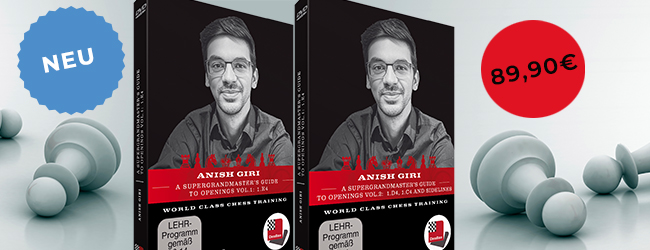
Während der Partien bietet GM Yasser Seirawan auf dem Fritzserver
Livekommentare als Audio/Video-Stream an (gegen eine Gebühr von 10 Dukaten,
entspricht 1 Euro)

Partiekommentar von GM Mihail Marin (in englischer Sprache)
Ausführlichere Kommentare (auch in deutscher Übersetzung) zum Wettkampf
werden im ChessBase Magazin 115 veröffentlicht.
(1) Kramnik,V (2743) - Topalov,V (2813) [E04]
WCh Elista RUS (1), 23.09.2006 [Mihail Marin]
The match had a promising start: 75 moves of uncompromising fight, abrupt
changes in the course of the game and... a decisive result. It could have all
ended in an "interesting draw" right after the first control if any player
other than Topalov had been playing with black. For Kramnik, the general
pattern must be quite familiar. Two years ago in Brissago, he also won the
first game of his match with Leko, after his opponent overstepped the limit
of admissible risk. It will be interesting to follow the way Topalov will
overcome this cold shower untill tomorrow.
1.d4 Nf6 2.c4 e6 3.Nf3 d5 4.g3 dxc4 5.Bg2 Bb4+. A relatively rare
continuation. More topical is 5...Nc6 ] 6.Bd2 a5 7.Qc2 Bxd2+ 8.Qxd2!?
This move is in slight contradiction with the general rules of development:
White moves for the second time in a row with an already developed piece.
Even more paradoxical is the justification of such a decision: White intends
to effectuate a new series of three consecutive moves with the queen in order
to win the pawn back! In fact, moving around with the queen before the
development of the other pieces has been completed is quite typical for the
Catalan, the most recent example in Kramnik's practice being his game against
Naiditsch from Dortmund 2006. The explanation why such radical deviations
from the normal course of the game are viable is probably connected with what
I would call "The quality of development". Indeed, the Catalan bishop is
sometimes so strong that it can compensate for a delay in the mobilization of
the other forces.
8...c6 9.a4 b5 10.axb5 cxb5 11.Qg5 0-0 12.Qxb5 Ba6 13.Qa4 Qb6 14.0-0
Qxb2 15.Nbd2 Bb5 16.Nxc4 Bxa4 17.Nxb2 Bb5. Finally, the piece in which
White has invested five tempi has been exchanged. White has a nice structure
of pawns and, after the next move, strong pressure along the h1-a8 diagonal.
However, Black's a-pawn should not be underestimated. In order to block it or
simply capture it, White will need to concentrate considerable amount of
resources on the queenside, leaving the other wing slightly weakened.

18.Ne5 Ra7 19.Bf3 Nbd7 20.Nec4 Rb8 21.Rfb1 g5 22.e3 g4 23.Bd1 Bc6
24.Rc1 Be4 25.Na4 Rb4 26.Nd6 Bf3!? This certainly looks like a
double-edged decision: will the pawn be a strength or a weakness? The further
course of the game offers us partial answers in both ways. The pawn kept
White passive for a long time but then perished without glory after Black's
first slip.
27.Bxf3 gxf3 28.Nc8 Ra8 29.Ne7+ Kg7 30.Nc6 Rb3 31.Nc5 Rb5 32.h3 Nxc5
33.Rxc5 Rb2 34.Rg5+ Kh6 35.Rgxa5 Rxa5 36.Nxa5 Ne4 37.Rf1 Nd2 38.Rc1 Ne4
39.Rf1 f6 40.Nc6 Nd2 41.Rd1 Ne4 42.Rf1 Kg6. With such a perfect
coordination of pieces (R + N + P), Topalov correctly assumes that he can
play for a win without too much risk. He might have also thought that even if
White would hold a draw, it would useful to take the psychological initiative
from the very first game of the match. However, he might have underestimated
the strength of the enemy knight, which, in spite of being cut off his
colleagues, is able to restrict Black's activity by attacking the enemy pawns
from behind.

43.Nd8 Rb6 44.Rc1 h5 45.Ra1 h4 46.gxh4 Kh5 47.Ra2 Kxh4 48.Kh2 Kh5
49.Rc2 Kh6 50.Ra2 Kg6 51.Rc2 Kf5 52.Ra2 Rb5 53.Nc6 Rb7 54.Ra5+ Kg6 55.Ra2
Kh5. After subtle maneouvers, Black has managed to create the deadly
threat ...Rg7-g2. However, White's (possibly) unexpected answer will mark the
turning point in the game.

56.d5! e5. For the time being, Topalov reacts correctly. 56...exd5
loses the pride of Black's position after 57.Nd4; but 56...Rg7 also seems to
keep Black in the game after 57.dxe6 Rg2+ 58.Kh1 Nxf2+ 59.Rxf2 Rxf2 60.e7
Rf1+ 61.Kh2 Rf2+ 62.Kg3 Rg2+ 63.Kxf3 Rg8 and only further analysis will show
whether White has any winning chances after transfering the knight to f5 and
defending it with the e-pawn.
57.Ra4 Now, Black loses stability in the centre and has to prove
certain inventivity in order to save the game. 57...f5? Probably
surprised by the unexpected course of events, Topalov fails to find his last
saving possibility, consisting of 57...Nxf2 58.Kg3 e4 and if 59.Kxf2 then
59...Rb2+ with perpetual.] 58.Nxe5 Rb2 59.Nd3 The rest is easy.
59...Rb7 60.Rd4 Rb6 61.d6 Nxd6 62.Kg3 Ne4+ 63.Kxf3 Kg5 64.h4+ Kf6 65.Rd5 Nc3
66.Rd8 Rb1 67.Rf8+ Ke6 68.Nf4+ Ke5 69.Re8+ Kf6 70.Nh5+ Kg6 71.Ng3 Rb2 72.h5+
Kf7 73.Re5 Nd1 74.Ne2 Kf6 75.Rd5 1-0. [Click
to replay].
 |
Mihail
Marin, 41, Romanian Grandmaster, three times national champion
(1988, 1994, 1999), nine times member of the Olympic team, participant in
two Interzonals (Szirak 1987 and Manila 1990). In 2005 Marin was the
second of Judit Polgar at the FIDE world championship in San Luis.
Highest rating: 2604. Author of the ChessBase opening CDs
English 1.c4
e5 and
The Catalan
Opening and the books: Secrets of Chess Defence, Secrets of
Attacking Chess and Learn from the Legends. Graduate from
the Polytechnic Institute Bucharest (Specialty Electrotechnic) in 1989.
|

























